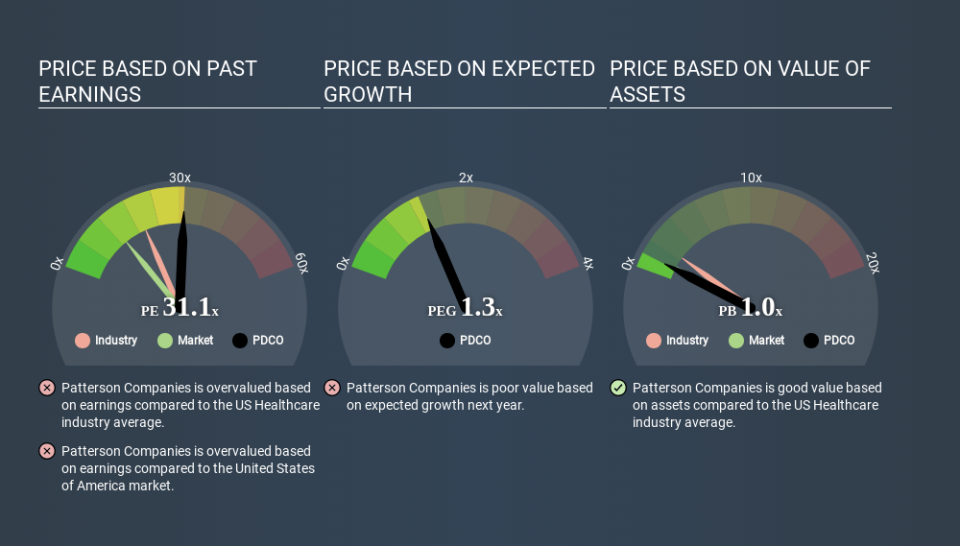What Is Patterson Companies's (NASDAQ:PDCO) P/E Ratio After Its Share Price Tanked?

Unfortunately for some shareholders, the Patterson Companies (NASDAQ:PDCO) share price has dived 34% in the last thirty days. The recent drop has obliterated the annual return, with the share price now down 27% over that longer period.
All else being equal, a share price drop should make a stock more attractive to potential investors. In the long term, share prices tend to follow earnings per share, but in the short term prices bounce around in response to short term factors (which are not always obvious). The implication here is that long term investors have an opportunity when expectations of a company are too low. Perhaps the simplest way to get a read on investors' expectations of a business is to look at its Price to Earnings Ratio (PE Ratio). A high P/E implies that investors have high expectations of what a company can achieve compared to a company with a low P/E ratio.
Check out our latest analysis for Patterson Companies
Does Patterson Companies Have A Relatively High Or Low P/E For Its Industry?
We can tell from its P/E ratio of 31.10 that there is some investor optimism about Patterson Companies. You can see in the image below that the average P/E (19.4) for companies in the healthcare industry is lower than Patterson Companies's P/E.
That means that the market expects Patterson Companies will outperform other companies in its industry. The market is optimistic about the future, but that doesn't guarantee future growth. So investors should delve deeper. I like to check if company insiders have been buying or selling.
How Growth Rates Impact P/E Ratios
Companies that shrink earnings per share quickly will rapidly decrease the 'E' in the equation. Therefore, even if you pay a low multiple of earnings now, that multiple will become higher in the future. A higher P/E should indicate the stock is expensive relative to others -- and that may encourage shareholders to sell.
Patterson Companies shrunk earnings per share by 39% over the last year. And over the longer term (5 years) earnings per share have decreased 23% annually. This could justify a pessimistic P/E.
A Limitation: P/E Ratios Ignore Debt and Cash In The Bank
It's important to note that the P/E ratio considers the market capitalization, not the enterprise value. So it won't reflect the advantage of cash, or disadvantage of debt. Hypothetically, a company could reduce its future P/E ratio by spending its cash (or taking on debt) to achieve higher earnings.
Spending on growth might be good or bad a few years later, but the point is that the P/E ratio does not account for the option (or lack thereof).
Patterson Companies's Balance Sheet
Net debt is 39% of Patterson Companies's market cap. You'd want to be aware of this fact, but it doesn't bother us.
The Bottom Line On Patterson Companies's P/E Ratio
Patterson Companies trades on a P/E ratio of 31.1, which is above its market average of 13.0. With modest debt but no EPS growth in the last year, it's fair to say the P/E implies some optimism about future earnings, from the market. Given Patterson Companies's P/E ratio has declined from 46.8 to 31.1 in the last month, we know for sure that the market is significantly less confident about the business today, than it was back then. For those who don't like to trade against momentum, that could be a warning sign, but a contrarian investor might want to take a closer look.
When the market is wrong about a stock, it gives savvy investors an opportunity. As value investor Benjamin Graham famously said, 'In the short run, the market is a voting machine but in the long run, it is a weighing machine. So this free visual report on analyst forecasts could hold the key to an excellent investment decision.
You might be able to find a better buy than Patterson Companies. If you want a selection of possible winners, check out this free list of interesting companies that trade on a P/E below 20 (but have proven they can grow earnings).
If you spot an error that warrants correction, please contact the editor at editorial-team@simplywallst.com. This article by Simply Wall St is general in nature. It does not constitute a recommendation to buy or sell any stock, and does not take account of your objectives, or your financial situation. Simply Wall St has no position in the stocks mentioned.
We aim to bring you long-term focused research analysis driven by fundamental data. Note that our analysis may not factor in the latest price-sensitive company announcements or qualitative material. Thank you for reading.

 Yahoo Movies
Yahoo Movies 

